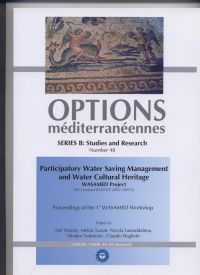| Article précédent | p. 289-296 | Article suivant |
Past climate and agricultural water management in the Mediterranean inferred from carbon isotope discrimination in archaeological plant remains
Knowing more about the way early farmers reacted to environmental changes may add clues to understand current water issues. The study of carbon isotope discrimination ( 13C) in archaeological plant remains can provide reliable information about water availability in ancient crops. In this paper, a such methodology is described, along with some case studies aimed at the reconstruction of ancient water management practices. Archaeological samples of faba bean, barley and wheat were analysed in order to assess possible changes in water status from Neolithic to present-day in the Mediterranean coast of the Iberian Peninsula, as well as in a Neolithic site from NW Syria. Moreover, by comparing values across several archaeological sites, we found evidences of differential water management practices between wheat and barley, as well as between cereal and legume crops, resembling some traditional practices that are still performed in dry areas.
- [ Afficher ]
- [ Télécharger ]
- [ Exporter la citation ]
Vous pouvez télécharger la citation au format :
- [ Imprimer ]
-
Mots-clés
CEREALE, EAU DISPONIBLE, GESTION DES EAUX, IRRIGATION, LEGUMINEUSE, RESSOURCE EN EAU, UTILISATION DE L'EAUCiter cet article
Ferrio J.P., Bort J., Voltas J., Araus J.L. Past climate and agricultural water management in the Mediterranean inferred from carbon isotope discrimination in archaeological plant remains. In : Hamdy A. (ed.), Tüzün M. (ed.), Lamaddalena N. (ed.), Todorovic M. (ed.), Bogliotti C. (ed.). Participatory water saving management and water cultural heritage. Bari : CIHEAM, 2004. p. 289-296. (Options Méditerranéennes : Série B. Etudes et Recherches; n. 48). 1. WASAMED (Water Saving in Mediterranean Agriculture) Workshop, 2003/12/15-19, Sanliurfa (Turkey). http://om.ciheam.org/om/pdf/b48/05002301.pdf



